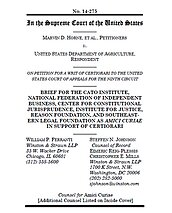Horne v. U.S. Dept. of Agriculture
Learn more about Cato’s Amicus Briefs Program.
In the feudal era, rulers funded their households by taking a share of the crops farmers in their territory produced. The lords called this tribute and the peasants would’ve called it extortion. We like to think that we’ve come quite a ways since then. After all, taxes are now paid withmoney—or even a digital abstraction of money—and forms, not cartloads of grain. We can even feel good (well, sanguine) about paying taxes, because we know that we’re funding the government of our own choosing—a democratically elected leadership restrained by the Constitution—not just feeding the avarice of a local warlord. Except if you’re a raisin farmer in California, a state responsible for 40% of the world’s and 99% of America’s raisins. If you’re a California serf raisin farmer, you’re required by federal law to hand over up to 47% of each year’s crop to the U.S. government so the government can control the supply and price of raisins under a New Deal-era regulatory scheme. Yet the Fifth Amendment says that “private property [shall not] be taken for public use, without just compensation,” so it’s hard to see how it would be constitutional for the government to take nearly half a farmer’s harvest without any payment—let alone “just compensation.” (To be clear, if you grow grapes for use in wine or juice, you’re fine. It’s only if you dry out those grapes that you have to watch your property rights evaporate.) Yet the U.S. Court of Appeals for the Ninth Circuit has done just that, repeatedly. In 2012, the en banc court held that nobody could challenge this taking in federal court. The Supreme Court unanimously disagreed. (For more background and to read Cato’s merits brief in that case go here.) Failing to take the hint, the Ninth Circuit has now held that the Fifth Amendment’s protection against state expropriation simply doesn’t apply to personal property (as opposed to real estate). To put it bluntly, that’s an arbitrary, unprecedented, and ahistorical distinction, so raisin farmers are once again forced to ask the Supreme Court to correct lower court’s failure to protect their rights. Joined by the five other organizations, Cato has filed a brief urging the Court to take this case, thus insuring that the farmers’ constitutional rights aren’t left to wither on the vine. We argue that the Ninth Circuit’s distinction between real and personal property has no basis in the text and history of the Constitution, Supreme Court precedent, or a reasonable understanding of the English language. The Fifth Amendment embodies the notion that property rights are central to a free people and a just government. It could not be more clear that property can’t be taken without “due process,” and that when it is taken, the government must pay “just compensation.” These guarantees reflect the many values inherent in private property, such as individual achievement, privacy, and autonomy from government intrusion. By devaluing property rights of all sorts, the Ninth Circuit weakens the values of autonomy and reliance that undergird the Takings Clause and conflicts with the very foundations of our constitutional order. Raisin farming ain’t easy; five pounds of grapes yield only one pound of raisins. Raisin farmers shouldn’t have to hand over half of that pound to the federal government.
